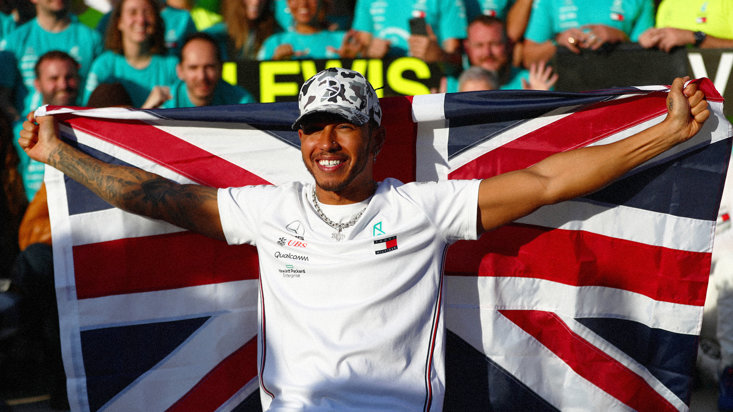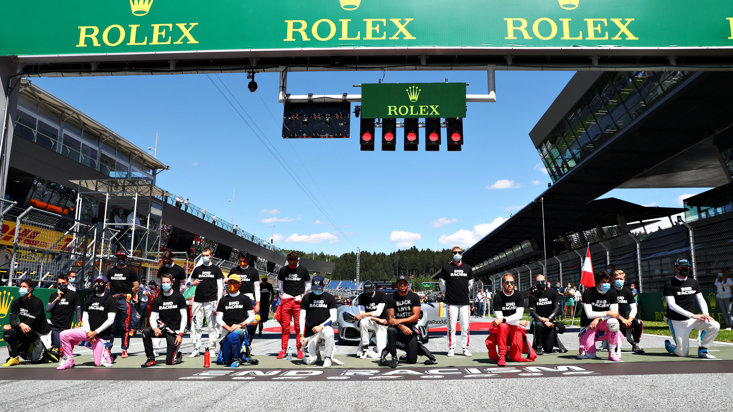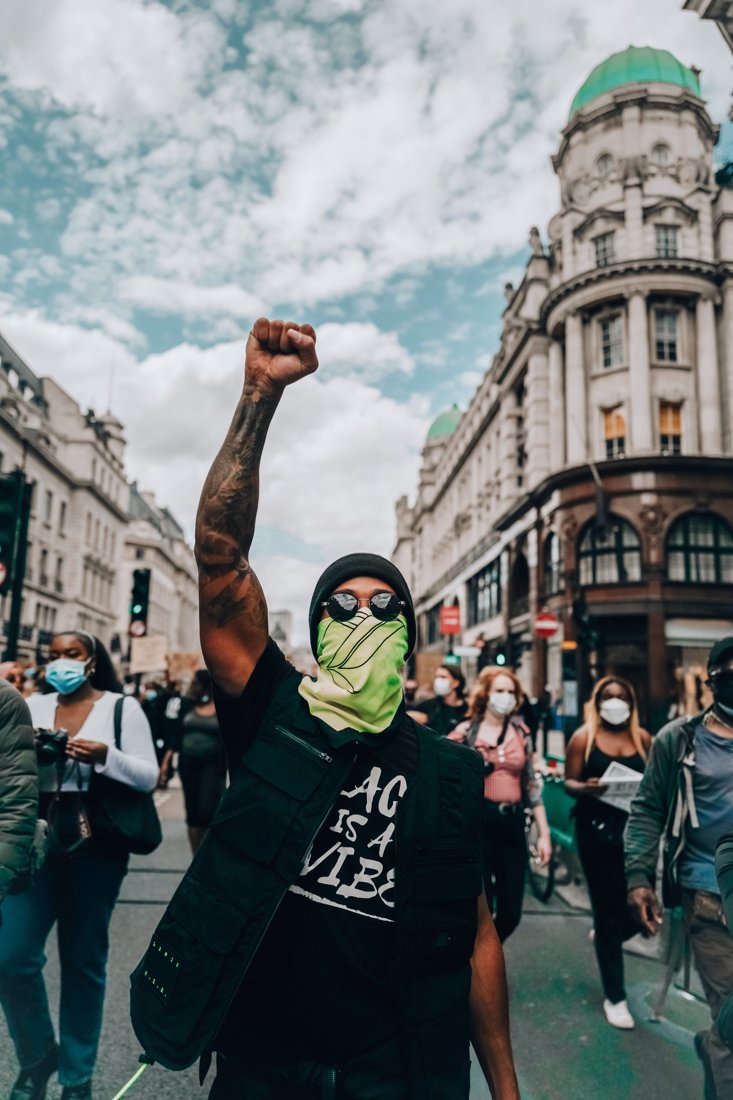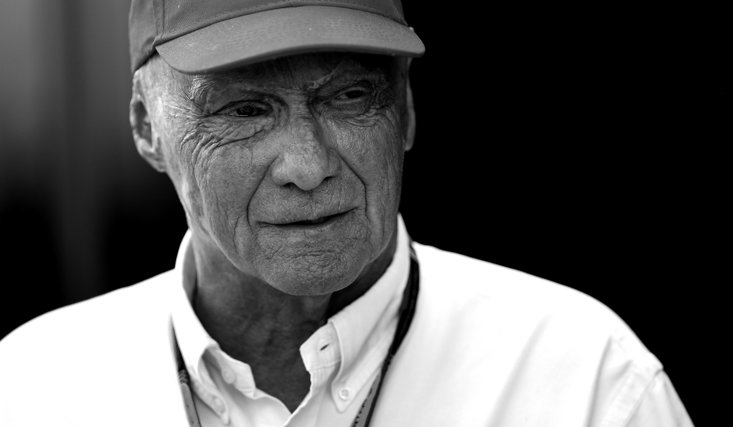“I'm an extremist so I'm either hated or loved.”
It’s safe to say the British public have never taken to Lewis Hamilton in the way they had his compatriot predecessors in the paddocks, Stirling Moss, Nigel Mansell, Jackie Stewart or James Hunt, despite him winning more World Championships than all of them combined.
Hunt offers perhaps the best comparison. In many ways he was Hamilton’s closest, foremost off-track precursor. The late Hunt was a cavorting cavalier away from the circuit, preaching the notorious mantra ‘Sex - Breakfast of Champions’, and had almost a death wish on it. Both recklessly driven in their profession, they also each consciously became fixtures of the wider celebrity scene, carving out individual, instantly recognisable presences even for those usually not enamoured with Formula One. Like Hunt, Hamilton has proven to have a penchant for beautiful women. He has dated models, singers, and a Pussycat Doll. Hamilton has been around the talk show circuit more than he has Silverstone. Hunt infamously refused to sign a clause in his McLaren contract that stipulated he wear a suit and tie to sponsor functions, preferring to be barefoot in only t-shirt and jeans, and took his German Shepherd, Oscar, to dinner with him in London’s West End.
But whereas Hunt came to be defined by all too relatable excess, it's the robotic efficiency and total devotion to becoming the best, presenting an image of almost physical perfection that hinders recognising Hamilton’s humanity. His success as an almost sterilised specifically-designed athlete is harder to warm to that than a character with obvious foibles. Therefore, any faults in Hamilton that can be identified are - and have been, inflamed.

Hamilton is the highest paid driver in the history of Formula One. In 2019, he signed a new two-year contract that pays more than $40 million annually from Mercedes to race for them, ascending his estimated net worth to half a billion dollars. As the most marketable driver the sport has ever seen, he added telecom Vodafone to his endorsement portfolio in 2020 to sit alongside partnerships with Bose, L'Oréal, Monster Energy, Police, Puma and Sony. With a long gestating passion for fashion, Hamilton started working with fashion brand Tommy Hilfiger in 2018 to promote lines of menswear, underwear and swimwear.
Marketable, however, does not necessarily mean likeable. Just because you want to be someone, doesn’t mean you have to be like or like someone.
In 2017, Lewis Hamilton was due to watch Novak Djokovic’s game against Roger Federer in the Wimbledon men’s singles final but was turned away from centre court because he did not adhere to the Lawn Tennis Association’s dress code. Men invited into the royal box, in which Hamilton had a seat, are expected to wear a jacket, tie and shoes. Hamilton was wearing neither a jacket, nor a tie. His rejection generated more than a few sniggers through social media.

Look beneath the surface to this incident however - and not just how Hunt may or may not have been treated had he rocked up to the royal box barefoot - and one can find a parable of a working-class hero being rejected from the establishment.
As has been well-documented, he comes from as far away from a privileged background usually required to enter the elite world of the premier motorsport. Stevenage-born with a father working multiple jobs to support his young son’s tentative career, Hamilton’s was a path drastically in contrast to the young upstarts who have followed - Lando Norris, Max Verstappen, Charles Leclerc, Lance Stroll.
Increasingly after that first championship in 2008 there have been two consistent sides to Hamilton; the driver, and the brand. It is these two parallels that have arguably created the division of public opinion.
A significant amount of criticism from his intent to protect his astonishing fortune that has made him the richest driver in the history of Formula One. He is contracted to Mercedes via a Guernsey company, holds a Malta company for image rights, and has lived as a tax exile since 2007, first in Switzerland and now in playboy’s paradise Monaco. Hamilton has been in the spotlight since he was 21 years old since he was announced by Ron Dennis to be McLaren’s new driver for the 2007 season.
Status as the ‘rookie’ granted him underdog status. His first win was celebrated. His second put a target on his back. Four more have been forthcoming in the space of five years. Hamilton possesses a relentless refusal to relinquish neither power nor prominence. Few drivers in F1 competition have ever been so dominant as Hamilton has been for the best part of the 21st Century so far.

Now there’s a third pillar to his persona, threatening to stand tallest: the activist. This image has been cultivated over the past several seasons, simultaneously as Hamilton - now 35 years old - has gradually become part of the F1 old guard. It is only the evergreen Kimi Räikkönen who, at 40 years old, is the only senior on the grid to Hamilton in 2020.
It is this increasingly apparent extra dimension to Hamilton that is likely to cement the champion in the hearts and minds of the British public: the social justice warrior. Hamilton has become increasingly outspoken as his prestige in the pantheon of F1 greats has grown. Using various platforms, Hamilton has advocated for veganism (‘Your gut is your second brain’) and the environment - issues and concerns that have brought praise and scorn in equal measure.
Notably, his was the most prominent knee bent at the 2020 curtain-raiser in Austria. In the wake of the murder of unarmed black man George Floyd in Minnesota in May, Hamilton has been even more vocal in his support for the Black Lives Matter movement, attending a protest in London, and helping instigated his Mercedes team into changing the colour of their cars from silver to black this year to signal their support for anti-racism and diversity. Furthermore he has been unafraid to call out those who haven’t shown to share his position. In one instance, he forcibly pushed his colleagues to the fore, shaming their silence.

"I see those of you who are staying silent, some of you the biggest stars yet you stay silent in the midst of injustice," Hamilton impassionately wrote on Instagram.
"Not a sign from anybody in my industry which of course is a white dominated sport. I'm one of the only people of colour there yet I stand alone.
"I would have thought by now you would see why this happens and say something about it but you can't stand alongside us.
"Just know I know who you are and I see you."
Months prior, just before the delay of the season, there was the debacle over the initial proceeding with the Australian Grand Prix, despite the escalation of the COVID-19 pandemic. Hamilton, despite likely wanting to defend his crown, acted as the lone, logical voice from the cockpit, stating both his despair at its intended proceeding and exactly why he believed the Australian Grand Prix was to be still taking place amidst the pandemic: "Cash is king."
His tendency for vocality and to face adversity head on is a trait he seems to have welcomed from his mentor, the late three-time world champion Niki Lauda, who urged greater safety checks and precautionary measures for drivers before his own near-fatal accident at the Nürburgring in 1976.

Lewis Hamilton has made one thing consistently clear: from now on, his motor comes with morality.
His cocksure attitude that is attractive to some, repugnant for others, still remains, but it is exactly this that has allowed him to exist as the paragon of his profession, and consequently have a greater platform to espouse societal change.
Fundamentally, a point unavoidable, he is a black man at the top of an almost-entirely white male dominated sport. He is the best. And he’s black.
"Kids need to see successful people who look like them to know that their dreams are achievable," Hamilton has said (Style), "Sadly, in Formula 1 today, there is an overall lack of diversity, not only among drivers, but also among engineers and mechanics.
"If we don't make the effort to create pathways to give those from different backgrounds a chance, we will all be to blame."
He carries around the shadow of celebrity that very few before him have been cloaked in to such an elevated level. His luminosity outside of the circuit, and sometimes his actions within it, will no doubt attract criticism.
But though Lewis Hamilton may still find his detractors, he knows that if he doesn’t shout loudest, he is likely not to be heard. The crown weighs heavy. Deprecators will continue to exist, however in the United Kingdom, devotees may well grow.